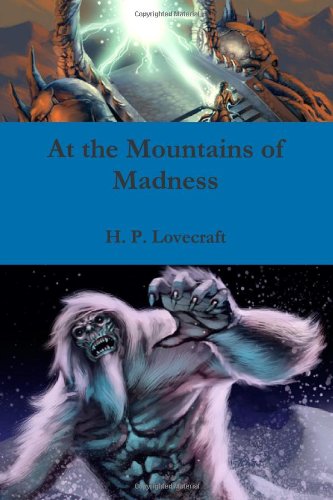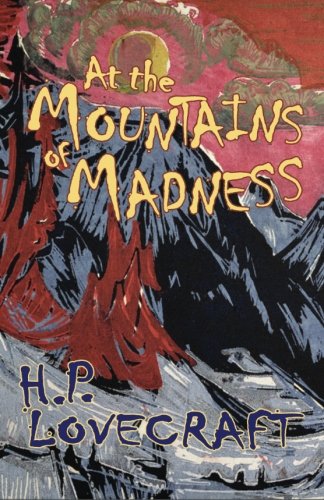 First appeared in F. Orlin Tremaine's Astounding (now Analog). Reprinted by August Derleth, David G. Hartwell, Robert M. Price, John Gregory Betancourt, Colin Azariah-Kribbs. The following reading lists recommend the novel: Anatomy of Wonder, The 5-Parsec Shelf, Fantasy: The 100 Best Books. Read online.
First appeared in F. Orlin Tremaine's Astounding (now Analog). Reprinted by August Derleth, David G. Hartwell, Robert M. Price, John Gregory Betancourt, Colin Azariah-Kribbs. The following reading lists recommend the novel: Anatomy of Wonder, The 5-Parsec Shelf, Fantasy: The 100 Best Books. Read online.SummaryThe narrator, Dr. William Dyer of a geology professor at Miskatonic University, treks with several men and dogs to the Antarctic. They discover a stone with unusual striations and see strange mirages. They uncover the bodies of the Old Ones and try to dissect. When the narrator and Danforth investigate what happened to one camp, their own camp is destroyed.
CommentaryThey discover a mountain range catacombed with tunnels and cave carvings. They read the history of the Precambrian aliens who lived there. They had their own animals brought during a time when Earth was thought only to have unicellular life. The Old Ones fought the Cthulhu lost--some moving undersea--and later won. The narrator and Danforth encounter giant albino penguins and other strange monstrosities. A greater evil lies just beyond. Danforth may have witnessed it.
The narrator and Danforth's goal is to steer away a new expedition headed down here--not to mention saying that humans are nothing in the cosmos.
Michael Chabon writes of At the Mountains of Madness as “One of the greatest short novels in American literature, and a key text in my own understanding of what that literature can do.”
When editors like David Hartwell, trying to capture the foundations of the horror field, reprint a short novel this long, it's got to be good. The chief rewards for those who admire sense of wonder come as the explorers enter the labyrinth of caves and examine the cave paintings around chapter six. It gives some of the best description of Lovecraft's cosmology.
 Reading his work, one appreciates a few literary attributes: brooding atmosphere and imagination. Lovecraft slammed Henry James's works of horror because of their lack of horrific atmosphere. James, though, was a master of character--something that Lovecraft runs low on. What do we know about our protagonist? How is his life shaped, transformed by events and other characters? Well, he's horrified, just as his companion Danforth and most of Lovecraft's characters.
Reading his work, one appreciates a few literary attributes: brooding atmosphere and imagination. Lovecraft slammed Henry James's works of horror because of their lack of horrific atmosphere. James, though, was a master of character--something that Lovecraft runs low on. What do we know about our protagonist? How is his life shaped, transformed by events and other characters? Well, he's horrified, just as his companion Danforth and most of Lovecraft's characters.What about plot? The shape is fairly simple. One encounters the strange; horrifying strangenesses pile up until the universe irrevocably horrifies the narrator. One reads Lovecraft for the same reason that readers read Olaf Stapledon: The writers are good at a few narrative traits--good enough that readers overlook flaws.
In his introduction to the Modern Library edition of the novel, China Miéville writes, "Genre writers, it is often claimed are uninterested in characterization, theme, or nuance, and instead vulgarly subordinate everything to the exigences of plot. This, of course, is nonsense. In fact many writers don't do plot either."
Miéville's point, besides humor, is that the genre has something unique outside of plot and character. In this field, writers like Lovecraft and Stapledon reap a bountiful harvest.
Miéville also claims that Lovecraft was on the cutting edge of science, pointing out his mentions of continental drift. Unfortunately, as S. T. Joshi points out in his annotations, continental drift had no proof at the time. Moreover, Lovecraft also mentioned ether, a hypothetical medium that light supposedly propagated through. The Michelson–Morley experiment decades earlier had proved this hypothesis false. Besides, Lovecraft's real point was to lower our estimation of human science and to suggest that universe contained more than puny humans can know.
And that's okay. Humans do sometimes overestimate their understanding of the universe. Moreover, Lovecraft's mind grasped onto the unusual, the stranger fictions--reality be damned. In fact, he treated his own, Edgar Allan Poe's and Clark Ashton Smith's fictional works as true within the fiction.
This is one of Lovecraft's cleaner works, told in a semi-academic style. Still, though many Lovecraft narrators are educated, they fail at words as soon as they confront the horrifying ineffable. Nonetheless, the writing is dotted with "things" difficult to see or experience. Note all the very different monsters illustrators created based on this novel (it may be, however, that the illustrators did not read the text in question).
Lovecraft often employs archaic spellings and words--not to mention neologisms--meant perhaps to create a dark, brooding atmosphere of the unknown. It not only makes for tough slogging, but also makes one wonder.
Miéville notes that "Lovecraft has... the transmogrifying vision of hysterical nihilism, from which his racism is inextricable."
Isn't Lovecraft's penchant of strange words, spellings like a foreign language, used to conjure horror--not unlike the speech of a foreigner? Now that I've stated the conjecture, someone will latch on to it as truth without further evidence, but it is a possibility worth considering.
 Even when his writing seems concrete, we may still not know what he means. For example, what does a "tempest-scarred plateau" look like?
Even when his writing seems concrete, we may still not know what he means. For example, what does a "tempest-scarred plateau" look like?I analyzed this text for adverbs (actually, the "-ly" ending) versus Mary Shelley's Frankenstein, and versus Ernest Hemingway's (roughly a contemporary of Lovecraft) "The Snows of Kilimanjaro". I chose the comparisons since Hemingway is roughly a contemporary of Lovecraft and Shelley is about a hundred years older than Lovecraft and writes in a similar genre as Lovecraft. Also, Lovecraft tries to write in an antiquary style, so it'd be interesting to see how closely he resembles the thing he imitates.
In terms of percentages, Lovecraft doubled Shelley's output and quadrupled Hemingway's (who also used his within quotes). I searched for the vague noun "things," and Lovecraft doubled Hemingway's output (also found in dialogue) and had fifteen times as many as Shelley. To an extent, this is what Lovecraft intended. The unknown and foreign are terrible (variants of "vague" appears twenty times in the text):
- "The effect of the monstrous sight was indescribable, for some fiendish violation of known natural law seemed certain at the outset."
- "[S]omething about the ridgy, barrel-shaped designs stirred up oddly vague, hateful, and confusing semi-remembrances in both Danforth and me."
- "[T]here was something vaguely but deeply unhuman in all the contours, dimensions, proportions, decorations, and constructional nuances of the blasphemously archaic stonework."
- "[T]he revived memories and vague impressions acting in conjunction with his general sensitiveness and with that final supposed horror-glimpse whose essence he will not reveal even to me - which has been the immediate source of Danforth’s present breakdown."
- "Something about this whole place, with its polished and almost glistening floor, struck us as more vaguely baffling and horrible than any of the monstrous things we had previously encountered."
- "For a second we gasped in admiration of the scene’s unearthly cosmic beauty, and then vague horror began to creep into our souls."

Brian Aldiss parodies the style as swollen by adjectivitis in "The Adjectives of Erich Zann, A Horror Story":
"I was aware of fear welling up inside me in a cascade of adjectives."
 Lovecraft's style has its defenders. Nick Mamatas, whose eloquent defense is worth reading, is buried somewhere in his blog. I cannot find the article at present. Indeed, Lovecraft does have his poetic moments, but usually when his prose solidifies in the concrete.
Lovecraft's style has its defenders. Nick Mamatas, whose eloquent defense is worth reading, is buried somewhere in his blog. I cannot find the article at present. Indeed, Lovecraft does have his poetic moments, but usually when his prose solidifies in the concrete. My only point, though, is that Lovecraft's prose strives to create a literary past that never existed. His prose reads nothing like Shelley's. His protagonists, too, were his contemporaries. So why were their writing and speech patterns antiquated? True that even into 19th century, some folks cultivated a King James speech pattern, especially when it came to piety and churches that used the King James Bible as their text, possibly even into the twentieth century. But Lovecraft does not follow King James. Who his antiquary literary antecedents are, remains unclear. Perhaps creating a literary past that never existed is his point. But for readers who prefer a smoother style or character or plot, it might make for challenging reading. If possible, one has to park one's notions of narrative at the book cover's front door.
My only point, though, is that Lovecraft's prose strives to create a literary past that never existed. His prose reads nothing like Shelley's. His protagonists, too, were his contemporaries. So why were their writing and speech patterns antiquated? True that even into 19th century, some folks cultivated a King James speech pattern, especially when it came to piety and churches that used the King James Bible as their text, possibly even into the twentieth century. But Lovecraft does not follow King James. Who his antiquary literary antecedents are, remains unclear. Perhaps creating a literary past that never existed is his point. But for readers who prefer a smoother style or character or plot, it might make for challenging reading. If possible, one has to park one's notions of narrative at the book cover's front door.



Hello!
ReplyDeleteHere you go: http://nihilistic-kid.livejournal.com/1893140.html
Perhaps also of interest:
http://lareviewofbooks.org/essay/real-mr-difficult-cthulhu-threatens-destroy-canon-self-interested-literary-essayists-universe-finally
Thanks, NM!
ReplyDelete